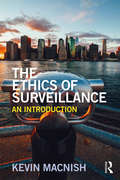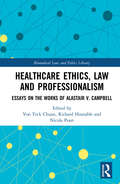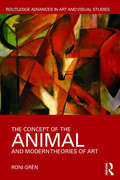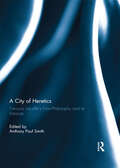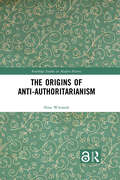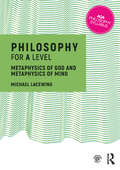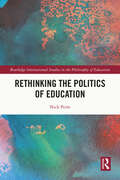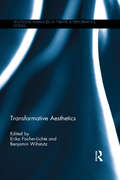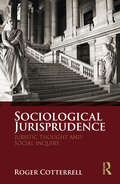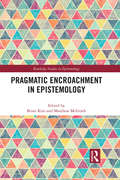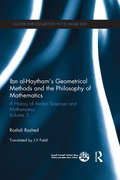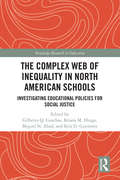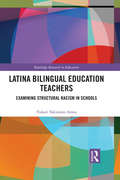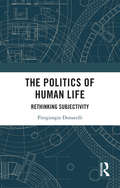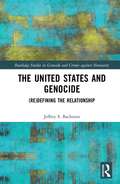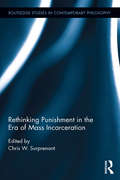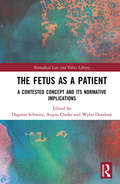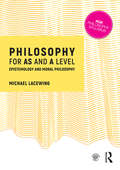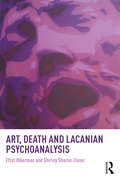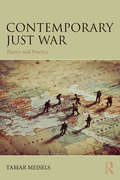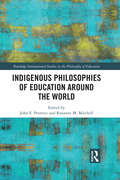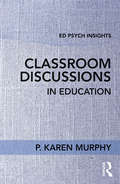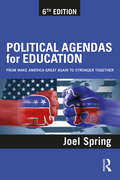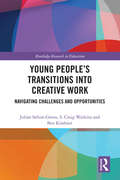- Table View
- List View
The Ethics of Surveillance: An Introduction (The Ethics of ...)
by Kevin MacnishThe Ethics of Surveillance: An Introduction systematically and comprehensively examines the ethical issues surrounding the concept of surveillance. Addressing important questions such as: Is it ever acceptable to spy on one's allies? To what degree should the state be able to intrude into its citizens' private lives in the name of security? Can corporate espionage ever be justified? What are the ethical issues surrounding big data? How far should a journalist go in pursuing information? Is it reasonable to expect a degree of privacy in public? Is it ever justifiable for a parent to read a child’s diary? Featuring case studies throughout, this textbook provides a philosophical introduction to an incredibly topical issue studied by students within the fields of applied ethics, ethics of technology, privacy, security studies, politics, journalism and human geography.
Healthcare Ethics, Law and Professionalism: Essays on the Works of Alastair V. Campbell (Biomedical Law and Ethics Library)
by Richard Huxtable Voo Teck Chuan Nicola PeartHealthcare Ethics, Law and Professionalism: Essays on the Works of Alastair V. Campbell features 15 original essays on bioethics, and healthcare ethics specifically. The volume is in honour of Professor Alastair V. Campbell, who was the founding editor of the internationally renowned Journal of Medical Ethics, and the founding director of three internationally leading centres in bioethics, in Otago, New Zealand, Bristol, UK, and Singapore. Campbell was trained in theology and philosophy and throughout his career worked with colleagues from various disciplines, including law and various branches of healthcare. The diversity of topics and depth of contributors’ insights reflect the breadth and impact of Campbell’s philosophical work and policy contributions to healthcare ethics. Throughout his long academic career, Campbell’s emphasis on healthcare ethics being practice-oriented, yet driven by critical reflection, has shaped the field in vital ways. The chapters are authored by leading scholars in healthcare ethics and law. Directly engaging with Campbell’s work and influence, the essays discuss essential questions in healthcare ethics relating to its methodology and teaching, its intersection with law and policy, medical professionalism, religion, and its translation in different cultural settings. Chapters also grapple with specific enduring topics, such as the doctor-patient relationship, justice in health and biomedical research, and treatment of the human body and the dead.
The Concept of the Animal and Modern Theories of Art (Routledge Advances in Art and Visual Studies)
by Roni GrénThis book examines the importance of the animal in modern art theory, using classic texts of modern aesthetics and texts written by modern artists to explore the influence of the human-animal relationship on nineteenth and twentieth century artists and art theorists. The book is unique due to its focus on the concept of the animal, rather than on images of animals, and it aims towards a theoretical account of the connections between the notions of art and animality in the modern age. Roni Grén’s book spans various disciplines, such as art theory, art history, animal studies, modernism, postmodernism, posthumanism, philosophy, and aesthetics.
A City of Heretics: François Laruelle's Non-Philosophy and its variants (Angelaki: New Work in the Theoretical Humanities)
by Anthony Paul SmithFrançois Laruelle has been developing his project of non-philosophy since the 1970s. Throughout this time he has aimed at nothing less than the discovery and development of a new form of thinking that draws its material from philosophy and related disciplines, but uses them in inventive new ways that are seen as heretical by standard philosophical approaches. The contributions to this volume highlight Laruelle’s own distinctive approach to the history of thought and bring together researchers in the Anglophone and Francophone world who have taken up the project of non-philosophy in their own way, developing new heresies, sometimes even in relation to non-philosophy itself. The contributions here show the scope of non-philosophy with essays on gender, science, religion, politics, animals, and the history of philosophy. They are all brought together, not in a city of intellectuals bound together by law, but within a city of heretics bound together only by their status as stranger. This book was originally published as a special issue of Angelaki.
The Origins of Anti-Authoritarianism (Routledge Studies in Modern History)
by Nina WitoszekThis book discusses the ongoing revolution of dignity in human history as the work of ‘humanist outliers’: small groups and individuals dedicated to compassionate social emancipation. It argues that anti-authoritarian revolutions like 1989’s ‘Autumn of the Nations’ succeeded in large part due to cultural and political innovations springing from such small groups. The author explores the often ingenious ways in which these maladapted and liminal ‘outliers’ forged a cooperative and dialogic mindset among previously resentful and divided communities. Their strategies warrant closer scrutiny in the context of the ongoing 21st century revolution of dignity and efforts to (re)unite an ever more troubled and divided world.
Philosophy for A Level: Metaphysics of God and Metaphysics of Mind
by Michael LacewingPhilosophy for A Level is an accessible textbook for the new 2017 AQA Philosophy syllabus. Structured closely around the AQA specification this textbook covers the two units, Metaphysics of God and Metaphysics of Mind, in an engaging and student-friendly way. With chapters on ‘How to do philosophy’, exam preparation providing students with the philosophical skills they need to succeed, and an extensive glossary to support understanding, this book is ideal for students studying philosophy. Each chapter includes: argument maps that help to develop students’ analytical and critical skills comprehension questions to test understanding discussion questions to generate evaluative argument explanation of and commentary on the AQA set texts ‘Thinking harder’ sections cross-references to help students make connections bullet-point summaries of each topic. The companion website hosts a wealth of further resources, including PowerPoint slides, flashcards, further reading, weblinks and handouts, all structured to accompany the textbook. It can be found at www.routledge.com/cw/alevelphilosophy.
Rethinking the Politics of Education (Routledge International Studies in the Philosophy of Education)
by Nick PeimRethinking the Politics of Education provides an entirely original rethinking of the modern and contemporary mythology of education. Problematizing the ideas concerning education as fulfilment and redemption, the book critically reviews the association of education with projects of social justice, democracy and improvement. This book argues for a fundamental rethinking of what education is, exploring how things stand with education and educational apparatuses in the contemporary world. It examines relations between educational discourses and their implied ontological stances and offers new ways of thinking that draw on ontological positions from psychoanalytical, philosophical and social discourses. The book contends that education is an essential form of politics and must be understood through a careful examination of its history modes of operation and its basic structures, rather than an idealized version of what it might be. Presenting an original and alternative account of a theoretically informed political ontology of education, the book will be of great interest to academics, researchers and postgraduate students interested in the philosophy of education, the politics of education, educational theory and the sociology of education.
Transformative Aesthetics: A New Aesthetics (Routledge Advances in Theatre & Performance Studies)
by Erika Fischer-Lichte Benjamin WihstutzAesthetic theory in the West has, until now, been dominated by ideas of effect, autonomy, and reception. Transformative Aesthetics uncovers these theories’ mutual concern with the transformation of those involved. From artists to spectators, readers, listeners, or audiences, the idea of transformation is one familiar to cultures across the globe. Transformation of the individual is only one part of this aesthetic phenomenon, as contemporary artists are increasingly called upon to have a transformative, sustainable impact on society at large. To this end, Erika Fischer Lichte and Benjamin Wihstutz present a series of fresh perspectives on the discussion of aesthetics, uniting Western theory with that of India, China, Australia, and beyond. Each chapter of Transformative Aesthetics focuses on a different approach to transformation, from the foundations of aesthetics to contemporary theories, breaking new ground to establish a network of thought that spans theatre, performance, art history, cultural studies, and philosophy.
Sociological Jurisprudence: Juristic Thought and Social Inquiry
by Roger CotterrellThis book presents a unified set of arguments about the nature of jurisprudence and its relation to the jurist’s role. It explores contemporary challenges that create a need for social scientific perspectives in jurisprudence, and it shows how sociological resources can and should be used in considering juristic issues. Its overall aim is to redefine the concept of sociological jurisprudence and outline a new agenda for this. Supporting this agenda, the book elaborates a distinctive juristic perspective that recognises law’s diversity of cultural meanings, its extending transnational reach, its responsibilities to reflect popular aspirations for justice and security, and its integrative tasks as a general resource of regulation for society as a whole and for the individuals who interact under law’s protection. Drawing on and extending the author’s previous work, the book will be essential reading for students, researchers and academics working in jurisprudence, law and society, socio-legal studies, sociology of law, and comparative legal studies.
Pragmatic Encroachment in Epistemology (Routledge Studies in Epistemology)
by Brian Kim Matthew McGrathAccording to philosophical lore, epistemological orthodoxy is a purist epistemology in which epistemic concepts such as belief, evidence, and knowledge are characterized to be pure and free from practical concerns. In recent years, the debate has focused narrowly on the concept of knowledge and a number of challenges have been posed against the orthodox, purist view of knowledge. While the debate about knowledge is still a lively one, the pragmatic exploration in epistemology has just begun. This collection takes on the task of expanding this exploration into new areas. It discusses how the practical might encroach on all areas of our epistemic lives from the way we think about belief, confidence, probability, and evidence to our ideas about epistemic value and excellence. The contributors also delve into the ramifications of pragmatic views in epistemology for questions about the value of knowledge and its practical role. Pragmatic Encroachment in Epistemology will be of interest to a broad range of epistemologists, as well as scholars working on virtue theory and practical reason.
Ibn al-Haytham's Geometrical Methods and the Philosophy of Mathematics: A History of Arabic Sciences and Mathematics Volume 5 (Culture and Civilization in the Middle East)
by Roshdi Rashed and J. V. FieldThis fifth volume of A History of Arabic Sciences and Mathematics is complemented by four preceding volumes which focused on the main chapters of classical mathematics: infinitesimal geometry, theory of conics and its applications, spherical geometry, mathematical astronomy, etc. This book includes seven main works of Ibn al-Haytham (Alhazen) and of two of his predecessors, Thābit ibn Qurra and al-Sijzī: The circle, its transformations and its properties; Analysis and synthesis: the founding of analytical art; A new mathematical discipline: the Knowns; The geometrisation of place; Analysis and synthesis: examples of the geometry of triangles; Axiomatic method and invention: Thābit ibn Qurra; The idea of an Ars Inveniendi: al-Sijzī. Including extensive commentary from one of the world’s foremost authorities on the subject, this fundamental text is essential reading for historians and mathematicians at the most advanced levels of research.
The Complex Web of Inequality in North American Schools: Investigating Educational Policies for Social Justice (Routledge Research in Education)
by Gilberto Q. Conchas Briana M. Hinga Miguel N. Abad Kris D. GutiérrezThe Complex Web of Inequality in North American Schools analyzes and challenges the critical gaps and inequalities that persist in the American school system. Showing how historical biases have been inherited in current polices relating to non-dominant youth, the text calls for educational reforms that perform in the name of social justice. This edited collection carefully interrogates how technocratic educational policies and reforms are often unequipped to address the interplay of political, social, economic, ideological factors that are at the roots of educational injustice. Considering the most vulnerable student populations, original case studies explore how inadequate structures, practices, and beliefs have increased marginalization, and highlight those instances in which policy has proved effective in reducing opportunity gaps between economically rich and poor students; between white, Asian, Black and Latino youth; between native English speakers and second language learners; highlighting racial integration and unequal American Indian education; and for students with special educational needs. The insights into such policies shed light on the complex web of historically embedded inequities that continue to shape the construction, roll-out, and consequences of education policy for the most marginalized youth populations today. This volume will be of interest to graduate, and postgraduate students, researchers and academics in the fields of education policy, sociology of education, economics of education, and history of education, and well as policy evaluation.
Latina Bilingual Education Teachers: Examining Structural Racism in Schools (Routledge Research in Education #22)
by Yukari Takimoto AmosUsing critical race theory and whiteness studies as theoretical frameworks, this book traces two Latina bilingual education teachers in three different professional phases: as paraprofessionals, teacher candidates, and certified teachers. Grounded in a longitudinal case study, this book sheds light on the effects of institutional racism when Latina/o educational professionals attempt inclusion in white dominant organizations, such as schools. Revealing and analyzing the structural racism present in schools and the obstacles it creates for professionals of color, the author exposes the racist practices that are hidden from view and offer practical solutions to combat them.
The Politics of Human Life: Rethinking Subjectivity
by Piergiorgio DonatelliThis book centres on the notion of human life that lies at the foundation of contemporary thinking in the areas of ethics, law and politics. Centrally, the book addresses the deep divide, characteristic of this thinking, between: on the one hand, those who wish to do away with any anthropological understandings of the human, and appeal to mere facts delivered by science; and, on the other hand, critics who defend an anthropological understanding of human life that is tied to traditional, teleological, metaphysics. In short: knowledge of the world is given over to the sciences and moral theory is considered to operate in a distinct, and insulated, domain. But this opposition has, Piergiorgio Donatelli argues here, outlived its usefulness. Through a discussion of the intimate human spheres of reproduction, dying and sexuality, he argues that we now live in a world characterized by new ways of living: by novel rearrangements of emotions, and by the modification, and in some cases a radical rupture in, existing ideas of human life. These shifts challenge any established separation between facts and norms, between human life and its conceptualization. As such, it is argued here, they simultaneously offer the possibility of a new, socially articulated, understanding of the relationship between subjectivity and normativity. Engaging pressing contemporary themes, this book will be invaluable to scholars in the fields of ethics, law and political theory, and both analytic and continental philosophy.
The United States and Genocide: (Re)Defining the Relationship (Routledge Studies in Genocide and Crimes against Humanity)
by Jeffrey S. BachmanThere exists a dominant narrative that essentially defines the US’ relationship with genocide through what the US has failed to do to stop or prevent genocide, rather than through how its actions have contributed to the commission of genocide. This narrative acts to conceal the true nature of the US’ relationship with many of the governments that have committed genocide since the Holocaust, as well as the US’ own actions. In response, this book challenges the dominant narrative through a comprehensive analysis of the US’ relationship with genocide. The analysis is situated within the broader genocide studies literature, while emphasizing the role of state responsibility for the commission of genocide and the crime’s ancillary acts. The book addresses how a culture of impunity contributes to the resiliency of the dominant narrative in the face of considerable evidence that challenges it. Bachman’s narrative presents a far darker relationship between the US and genocide, one that has developed from the start of the Genocide Convention’s negotiations and has extended all the way to present day, as can be seen in the relationships the US maintains with potentially genocidal regimes, from Saudi Arabia to Myanmar. This book will be of interest to scholars, postgraduates, and students of genocide studies, US foreign policy, and human rights. A secondary readership may be found in those who study international law and international relations.
Rethinking Punishment in the Era of Mass Incarceration (Routledge Studies in Contemporary Philosophy)
by Chris W. SurprenantOne of the most important problems faced by the United States is addressing its broken criminal justice system. This collection of essays offers a thorough examination of incarceration as a form of punishment. In addition to focusing on the philosophical aspects related to punishment, the volume’s diverse group of contributors provides additional background in criminology, economics, law, and sociology to help contextualize the philosophical issues. The first group of essays addresses whether or not our current institutions connected with punishment and incarceration are justified in a liberal society. The next set of chapters explores the negative effects of incarceration as a form of punishment, including its impact on children and families. The volume then describes how we arrived at our current situation in the United States, focusing on questions related to how we view prisons and prisoners, policing for profit, and the motivations of prosecutors in trying to secure convictions. Finally, Rethinking Punishment in the Era of Mass Incarceration examines specific policy alternatives that might offer solutions to our current approach to punishment and incarceration.
The Fetus as a Patient: A Contested Concept and its Normative Implications (Biomedical Law and Ethics Library)
by Dagmar Schmitz Angus Clarke Wybo DondorpDue to new developments in prenatal testing and therapy the fetus is increasingly visible, examinable and treatable in prenatal care. Accordingly, physicians tend to perceive the fetus as a patient and understand themselves as having certain professional duties towards it. However, it is far from clear what it means to speak of a patient in this connection. This volume explores the usefulness and limitations of the concept of ‘fetal patient’ against the background of the recent seminal developments in prenatal or fetal medicine. It does so from an interdisciplinary and international perspective. Featuring internationally recognized experts in the field, the book discusses the normative implications of the concept of ‘fetal patient’ from a philosophical-theoretical as well as from a legal perspective. This includes its implications for the autonomy of the pregnant woman as well as its consequences for physician-patient-interactions in prenatal medicine.
Philosophy for AS and A Level: Epistemology and Moral Philosophy
by Michael LacewingPhilosophy for AS and A Level is an accessible textbook for the new 2017 AQA Philosophy syllabus. Structured closely around the AQA specification this textbook covers the two units shared by the AS and A Level, Epistemology and Moral Philosophy, in an engaging and student-friendly way. With chapters on 'How to do philosophy', exam preparation providing students with the philosophical skills they need to succeed, and an extensive glossary to support understanding, this book is ideal for students studying philosophy. Each chapter includes: argument maps that help to develop student’s analytical and critical skills comprehension questions to test understanding discussion questions to generate evaluative argument explanation and commentary on the AQA set texts ‘Thinking harder’ sections cross-references to help students make connections bullet-point summaries of each topic. The companion website hosts a wealth of further resources, including PowerPoint slides, flashcards, further reading, weblinks and handouts, all structured to accompany the textbook. It can be found at?www.routledge.com/cw/alevelphilosophy.
Gender Diversity and LGBTQ Inclusion in K-12 Schools: A Guide to Supporting Students, Changing Lives
by Sharon Verner Chappell Karyl E. Ketchum Lisa RichardsonThis exploration of effective practices to support lesbian, gay, bisexual, transgender, queer (LGBTQ) and gender-diverse students in elementary, middle, and high school contexts focuses on curriculum, pedagogy, and school environment. Narratives and artwork from the field are framed by sociocultural and critical theory as well as research-based elaboration on the issues discussed. Applications of antidiscrimination law and policy, as well as learning skills like creativity, collaboration, and critical thinking help teachers tackle some of the most significant educational challenges of our time. The stories of real-world practices offer encouragement for building inclusive environments and enhancing social-emotional relationships among youth, families, and schools. Gender Diversity and LGBTQ Inclusion in K-12 Schools provides a helpful roadmap for educators hoping to create safe and empowering spaces for LGBTQ and gender-diverse students and families.
Art, Death and Lacanian Psychoanalysis
by Efrat Biberman Shirley Sharon-ZisserArt, Death and Lacanian Psychoanalysis examines the relationship between art and death from the perspective of Lacanian psychoanalysis. It takes a unique approach to the topic by making explicit reference to the death drive as manifest in theories of art and in artworks. Freud’s treatment of death focuses not on the moment of biological extinction but on the recurrent moments in life which he called "the death drive" or the "compulsion to repeat": the return precisely of what is most unbearable for the subject. Surprisingly, in some of its manifestations, this painful repetition turns out to be invigorating. It is this invigorating repetition that is the main concern of this book, which demonstrates the presence of its manifestations in painting and literature and in the theoretical discourse concerning them from the dawn of Western culture to the present. After unfolding the psychoanalytical and philosophical underpinnings for the return of the death drive as invigorating repetition in the sphere of the arts, the authors examine various aspects of this repetition through the works of Gerhard Richter, Jeff Wall, and contemporary Israeli artists Deganit Berest and Yitzhak Livneh, as well as through the writings of Virginia Woolf and James Joyce. First to articulate the stimulating aspect of the death drive in its relation to the arts and the conception of art as a varied repetition beyond a limit, Art, Death and Lacanian Psychoanalysis will be indispensable to psychoanalysts, scholars of art theory and aesthetics and those studying at the intersection of art and psychoanalysis.
Contemporary Just War: Theory and Practice (War, Conflict and Ethics)
by Tamar MeiselsThis book offers a renewed defense of traditional just war theory and considers its application to certain contemporary cases, particularly in the Middle East. The first part of the book addresses and responds to the central theoretical criticisms levelled at traditional just war theory. It offers a detailed defense of civilian immunity, the moral equality of soldiers and the related dichotomy between jus ad bellum and jus in bello, and argues that these principles taken together amount to a morally coherent ethics of war. In this sense this project is traditional (or "orthodox"). In another sense, however, it is highly relevant to the modern world. While the first part of the book defends the just war tradition against its revisionist critics, the second part applies it to an array of timely issues: civil war, economic warfare, excessive harm to civilians, pre-emptive military strikes, and state-sponsored assassination, which require applying just war theory in practice. This book sets out to reaffirm the basic tenets of the traditional ethics of war and to lend them further moral support, subsequently applying them to a variety of practical issues. This book will be of great interest to students of just war theory, ethics, security studies, war and conflict studies, and IR in general.
Indigenous Philosophies of Education Around the World (Routledge International Studies in the Philosophy of Education #19)
by John E. Petrovic Roxanne M. MitchellThis volume explores conceptualizations of indigeneity and the ways that indigenous philosophies can and should inform educational policy and practice. Beginning with questions and philosophies of indigeneity itself, the volume then covers the indigenous philosophies and practices of a range of communities—including Sami, Maori, Walpiri, Navajo and Kokama peoples. Chapter authors examine how these different ideals can inform and create meaningful educational experiences for communities that reflect indigenous ways of life. By applying them in informing a philosophy of education that is particular and relevant to a given indigenous community, this study aims to help policy makers and educational practitioners create meaningful educational experiences.
Classroom Discussions in Education: Improving Students' Comprehension Through Productive Talk About Text (Ed Psych Insights)
by P. Karen MurphyClassroom discussion is a concept familiar across the field of education and is often employed to support students’ comprehension of text. Edited by a leading expert on classroom discussion, this book situates the topic within the broader context of educational psychology research and theory and brings it to a wider audience. Five chapters describe in detail the different approaches to discussion and provide recommendations for best practices and curricular materials for student success. This concise volume is designed for any education course that includes discussion in the curriculum and is indispensible for student researchers and both pre- and in-service teachers alike.
Political Agendas for Education: From Make America Great Again to Stronger Together
by Joel SpringFollowing the epic, contentious 2016 presidential election, Joel Spring’s ongoing documentation and analysis of political agendas for education reflect the major political issues since 2012. Here he examines the 2016 education planks of the Republican, Democratic, Libertarian, and Green Parties, using their official platforms and other statements, speeches given by each candidate, and media reports and publications. Each party’s position is linked to previous political movements in education. Spring offers an alternative agenda for American schools, including a proposed education amendment to the U.S. Constitution and replacing human capital agendas with goals emphasizing education for a long life and happiness. Taking a fresh look at the social and political forces, educational research, and ideologies shaping their educational agendas and a comparative approach, the book stimulates reflection and discussion. Updates and changes in the Sixth Edition: Betsy DeVos’s education agenda supporting vouchers, free market competition and for-profit schools and its relationship to the education section of the 2016 Republican platform The important role religion and culture played in the evolution of Republican education policies after the school prayer and Bible decisions of the 1960s The influence of human capital economics on Democratic education proposals How No Child Left Behind and Democratic President Barack Obama opened doors to the growth of the for-profit education industry and investment bankers The 2016 Democratic positions on the cost of higher education and student loan debts The Democratic left as represented by the 2016 campaign of Democrat Bernie Sanders and his influence on the presidential candidate Hillary Clinton and the Democratic Party platform The education proposals of the Green and Libertarian parties
Young People’s Transitions into Creative Work: Navigating Challenges and Opportunities (Routledge Research in Education)
by Julian Sefton-Green Ben Kirshner S Craig WatkinsExploring how formal and informal education initiatives and training systems in the US, UK and Australia seek to achieve a socially diverse workforce, this insightful book offers a series of detailed case studies to reveal the initiative and ingenuity shown by today’s young people as they navigate entry into creative fields of work. Young People’s Journeys into Creative Work acknowledges the new and diverse challenges faced by today's youth as they look to enter employment. Chapters trace the rise of indie work, aspirational labour, economic precarity, and the disruptive effects of digital technologies, to illustrate the oinventive ways in which youth from varied socio-economic and cultural backgrounds enter into work in film, games production, music, and the visual arts. From hip-hop to new media arts, the text explores how opportunities for creative work have multiplied in recent years as digital technologies open new markets, new scenes, and new opportunities for entrepreneurs and innovation. This book will be of great interest to researchers, academics and postgraduate students in the fields of youth studies, careers guidance, media studies, vocational education and sociology of education.
